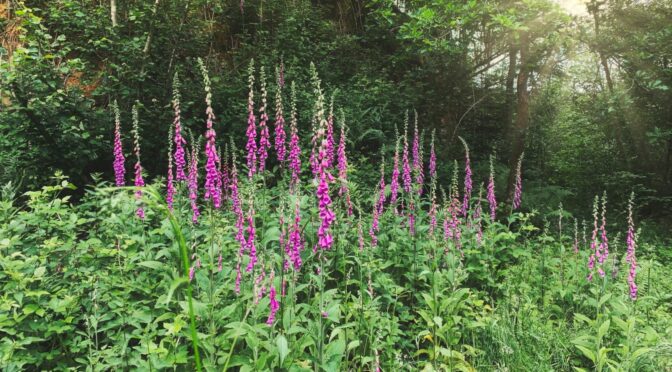Gardening is an age-old occupation, and over the years, gardeners have come up with some interesting ways to improve their production. Garden folklore has helped gardeners decide when to plant, how to plant, when to harvest, and other essential tasks over the years. Some of these traditions have a solid basis; others maybe not so much. We’ll let you decide.
Never say “thank you” for a plant.
A common belief in Appalachia is that you should never thank someone for a plant or cutting. Some folks say it’s just bad luck and others say the plant will die. Either way, best to just give a response like, “what a gorgeous a pepper.”
Foxglove is often associated with fairies or witches.
People once believed that foxgloves were associated with faeries. Foxgloves grew where the faeries flourished, and planting them would invite faeries to your garden. It was considered bad luck to cut them.
Today some believe that the name foxglove may have been initially “folk’s glove” as fairies were sometimes referred to as “the folk.” In Norwegian folklore, it was believed they were named foxgloves because faeries taught foxes how to ring the foxgloves’ bell-shaped flowers and warn each other of hunters.
Witches were reported to make ointments and balms from foxglove that allowed them to fly. Although foxglove may have never allowed anyone to physically fly, there is some tidbit of truth behind this belief. An herbal preparation called “flying ointments” were once created from various hallucinogenic and toxic plants and allowed the users to have visions. You can read a bit more about this odd tradition here.
Never consume or use any part of foxglove in an ointment or herbal remedy. All parts of the plant are extremely toxic.
Plant your corn when the oak leaves are the size of a squirrel’s ear.
We still include this one in our corn-growing guide! Corn should be planted after your first average frost-free date, and you can usually count on the oak leaves starting to grow by then. 
Plant above ground crops during the waxing moon and below ground crops during the waning moon.
Planting by the phases of the moon was once a common tradition and is still used by many gardeners. A common belief was that the moonlight increasing or decreasing each night affected which plant parts would grow best.
Increasing moonlight (a waxing moon) was believed to encourage the growth of leaves and stems, so it was an excellent time to plant crops like tomatoes, winter squash, cucumbers, corn, and peppers. Decreasing moonlight (a waning moon) was believed to encourage the growth of bulbs, tubers, and roots, so it was a good time to plant crops like potatoes, carrots, onions, sweet potatoes, and flowering bulbs.
Plant potatoes and peas on St. Patrick’s Day.
In many parts of the U.S., it was considered good luck to plant these crops on St. Patrick’s Day. This generally works well for folks in zone 5 or higher. Other folks believe it’s best to plant potatoes on Good Friday.
It’s time to plant when you can sit on your garden soil without pants on and not get cold.
This is a funny old bit of folklore but it still rings true. Many vegetable crops need warm soils (around 60°F) to germinate and grow well. Soil thermometers weren’t always as easy to come by as they are today and gardeners have always been a determined lot!
Fennel wards off evil.
Traditionally, people hung bundles of fennel over doorways to ward off evil spirits, witches, and demons. Some folks went as far as to stuff it in gaps and keyholes to help seal their home from evil.
Add Epsom salts to your soil to fix plant issues.
I’ve seen this one floating around the internet lately, and it may rarely be correct. Epsom salts contain magnesium and sulfur, which plants do need. However, these are just two nutrients your plants need, and odds are your soil isn’t deficient in them. If you’re having a lot of issues keeping plants healthy, get a soil test and learn how to understand it.
Stolen plants will grow better.
There are a couple of versions of this one. Some say it’s all plants, while others say it’s just herbs. Sometimes stealing the plants is good luck in general, while others say the plant will grow better. This tradition is still alive today, and some people will turn around when giving away plants so that the recipient can “steal” them.
Planting peppers when you’re mad will make the peppers hotter.
I’m not sure when this one got started, but it’s a fun bit of folklore. Next time you’re mad about the weeds or wildlife getting into your garden, add a few more pepper plants and let us know how this one goes.
Do you have any garden traditions? Have you tried any of these? Let us know on Facebook! While not all these traditions are practical, they are fun to think about!

